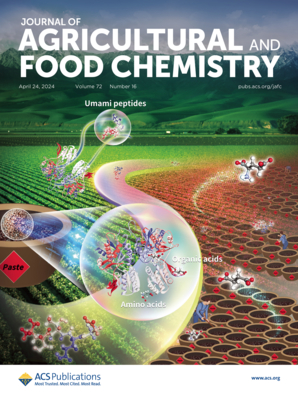发酵小麦胚芽改善大鼠高脂肪饮食诱导的母体肥胖:来自微生物组学和代谢组学的见解。
IF 6.2
1区 农林科学
Q1 AGRICULTURE, MULTIDISCIPLINARY
引用次数: 0
摘要
母亲肥胖显著增加了母亲和胎儿不良后果的风险。发酵小麦胚芽(FWG)已被证明具有改善代谢紊乱的潜力,但其在母体肥胖模型中的作用尚未被探索。本研究通过生化、肠道微生物组学和血清代谢组学分析,探讨了FWG对母鼠肥胖的改善作用,重点探讨了其机制。结果表明,与小麦胚芽相比,FWG在减少体重增加和脂肪积累、改善糖脂代谢紊乱和减轻炎症方面更有效。具体来说,FWG通过促进有益菌(如棒状杆菌)的生长来调节肠道微生物群的组成,同时抑制与母体肥胖相关的属(如Blautia, Akkermansia, Dorea_A和Faecousia)。此外,FWG修饰了高脂肪饮食诱导的代谢物,主要影响嘧啶代谢和氨基酸代谢。这些发现表明,FWG可能作为一种有希望的饮食干预,减轻产妇肥胖和改善妊娠结局。本文章由计算机程序翻译,如有差异,请以英文原文为准。
Fermented Wheat Germ Ameliorates High-Fat Diet-Induced Maternal Obesity in Rats: Insights from Microbiome and Metabolomics.
Maternal obesity significantly increases the risk of adverse outcomes for the mother and fetus. Fermented wheat germ (FWG) has demonstrated the potential to improve metabolic disorders, yet its effects have not been explored in maternal obesity models. This study investigated the ameliorating impact of FWG in rats with maternal obesity, focusing on its mechanisms through biochemical, gut microbiome, and serum metabolomics analysis. The results demonstrated that FWG was more effective than wheat germ in reducing body weight gain and fat accumulation, improving glycolipid metabolism disorders, and alleviating inflammation. Specifically, FWG modulated the composition of gut microbiota by fostering the growth of beneficial bacteria (e.g., Corynebacterium) while suppressing genera associated with maternal obesity (e.g., Blautia, Akkermansia, Dorea_A, and Faecousia). Furthermore, FWG modified high-fat diet-induced metabolites, primarily affecting pyrimidine metabolism and amino acid metabolism. These findings suggest that FWG may serve as a promising dietary intervention for mitigating maternal obesity and improving pregnancy outcomes.
求助全文
通过发布文献求助,成功后即可免费获取论文全文。
去求助
来源期刊
CiteScore
9.90
自引率
8.20%
发文量
1375
审稿时长
2.3 months
期刊介绍:
The Journal of Agricultural and Food Chemistry publishes high-quality, cutting edge original research representing complete studies and research advances dealing with the chemistry and biochemistry of agriculture and food. The Journal also encourages papers with chemistry and/or biochemistry as a major component combined with biological/sensory/nutritional/toxicological evaluation related to agriculture and/or food.

 求助内容:
求助内容: 应助结果提醒方式:
应助结果提醒方式:


